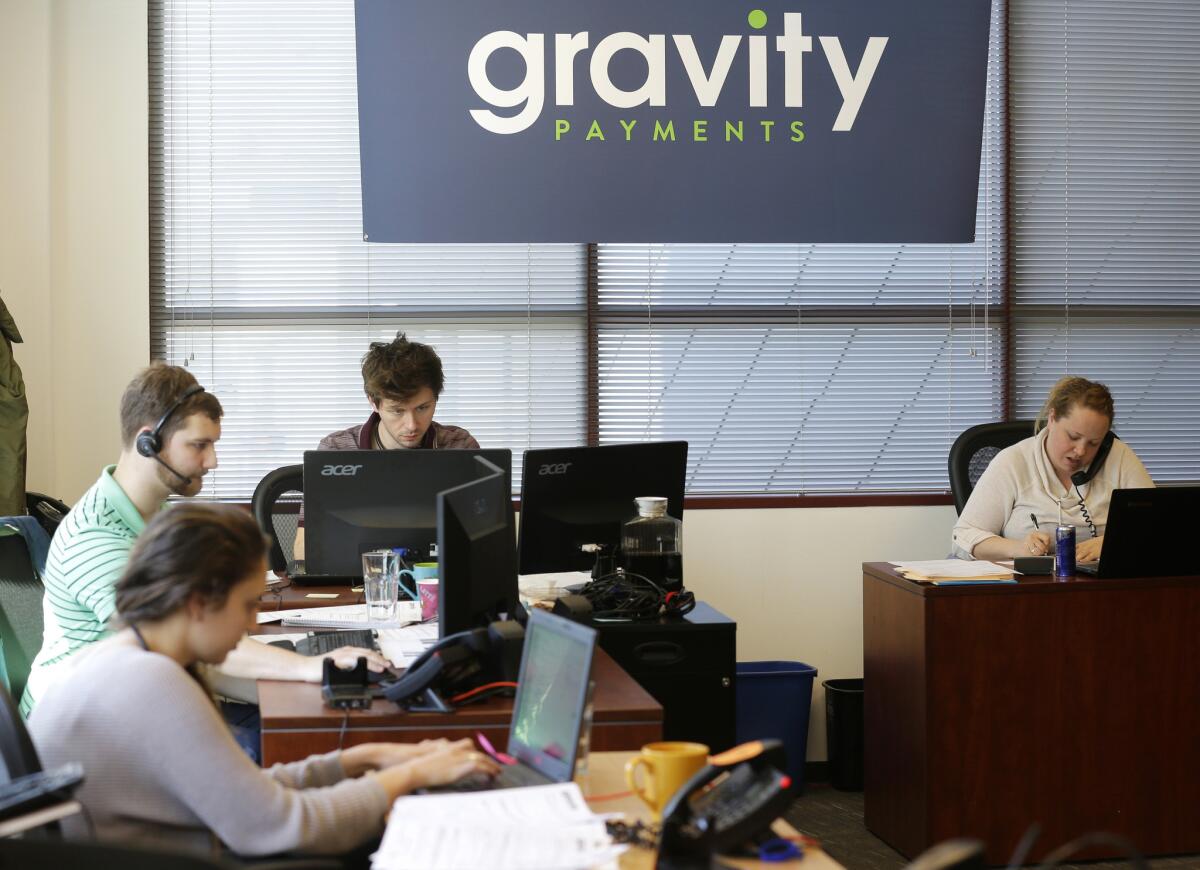Seattle CEO who cut his pay sees a ‘moral imperative’ to bridge income gap

Sales representatives at Gravity Payments, where Chief Executive Dan Price says he will slash his own salary and boost that of employees.
- Share via
Reporting from Seattle — Dan Price was about a mile into a Sunday hike on scenic Mt. Si when he knew what he had to do to change his life — and the lives of others.
His hiking partner and close friend had just been notified that her rent was going up. She had no idea how she would afford the extra couple hundred dollars a month on her salary as the hardworking manager of a luxury spa in pricey Puget Sound.
That’s when it hit him. Many of his own employees at Gravity Payments had similar money problems. He was making $1million a year, and the lowest-paid of his workers was averaging about $35,000.
So he decided he would cut his pay, first to $50,000, rising to $70,000 by the end of 2017.
That would make his compensation mirror his company’s lowest-paid employees — after he gave them generous raises.
“I was thinking about doing something big,” Price said in an interview Thursday. “I needed to bite the bullet. I came up with the idea on the spot. I had to work out the numbers, tell five or six senior managers and make sure I wasn’t crazy.”
During his company’s regular quarterly meeting on Monday, he broke the news to his staff. At first, there was silence. Then cheers. Then hugs.
“Everybody was in shock,” said Jose Garcia, a 29-year-old customer support representative at Gravity, which processes credit card payments for independent businesses across the country. “Nobody said anything for 45 seconds. It’s wonderful news.”
Garcia lives with his sister, a teacher, in West Seattle so they can both make ends meet. He says his $37,000 annual salary will rise to $50,000 immediately and reach $70,000 by the end of 2017. He will be able to pay down student loans and not worry if his car breaks down or he faces an unexpected medical bill.
“It’s granting me peace of mind,” Garcia said. “I don’t have to worry. I can do my job, worry about my customers and give the service we pride ourselves on.”
Price, 30, is single and dotes on his rescue dog, Mikey. He sees it as a moral imperative to do what he can to help bridge the gap between rich and poor here in the fastest-growing city in America.
He remembers watching a “60 Minutes” report on the working poor in Florida — people who lived in motels and cars and had jobs but were falling further behind no matter what they did. He sobbed.
He paid attention when progressive Seattle raised the minimum wage to $15 an hour, becoming the first city in America to do so.
Deciding and doing are very different things, however.
Every day between the March 29 hike and his announcement Monday, he said, he lost sleep. One day he woke up at 3:30 a.m., convinced he shouldn’t take such a dramatic step. He spent the next three hours writing a five-page memo.
The gist? “Dear Self, do it anyway.”
So he did.
“I’m incredibly glad I did it,” he said in a phone interview from New York, where he has been the darling of television, radio and print, and where strangers have come up to thank him.
“That’s the way I want to live my life.... It was a huge relief to do it and stop thinking about it.”
Gravity, a privately held company, made about $2.2 million in profit last fiscal year. About 70 people in the 120-worker company will get salary hikes starting with their next paycheck, on April 24. About 30 of them will receive “dramatic” raises, said Ryan Pirkle, Gravity’s marketing manager.
Price’s $930,000 pay cut will not cover the cost of his employees’ raises, and he expects profits to drop to about $500,000 this year. He will not take a raise until profits return to their 2014 levels, he said, but that’s OK. He’ll keep driving the Audi he bought in 2003 and will postpone moving downtown from Seattle’s graceful Magnolia neighborhood, where he owns a house.
“I want to prove that this can work,” Price said. “And it’s going to be motivating to my team. And for me.”
So far, the response has been largely positive.
Mayor Ed Murray, who presided over the city’s minimum-wage hike, applauded Price’s action and said it “reflects where Seattle is. It’s a progressive city. We’re engaged in this discussion around income inequality and the issue of affordability.”
Pirkle says the company has been flooded with admiring emails and job applications — and with one “tirade,” from none other than talk show host Rush Limbaugh.
“This is pure, unadulterated socialism, which has never worked,” Limbaugh said. “That’s why I hope this company is a case study in MBA programs on how socialism does not work, because it’s gonna fail.”
That’s not how Nydelis Ortiz sees it. The 25-year-old underwriting analyst joined Gravity in January and is making $36,000 a year. She’s the first person in her family to go to college. She spent her childhood in low-income housing. She owes about $40,000 in student loans.
And she just got the biggest raise of her life.
She plans to buy a plane ticket for her mother, who lives in Vermont, so she can come West for Mother’s Day.
Twitter: @marialaganga
More to Read
Sign up for Essential California
The most important California stories and recommendations in your inbox every morning.
You may occasionally receive promotional content from the Los Angeles Times.














